Aeolus Quartet (USA)
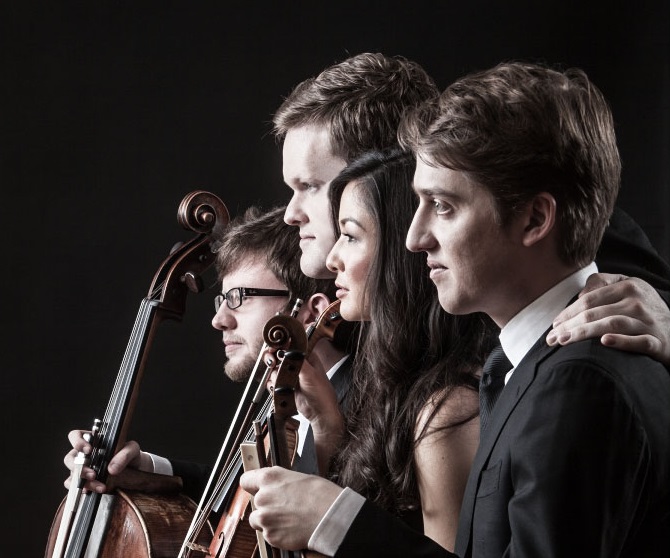
Biography and Competition Repertoire
Nicholas Tavani, violin
Rachel Shapiro, violin
Gregory Luce, viola
Alan Richardson, cello
Praised by the Baltimore Sun for combining “smoothly meshed technique with a sense of spontaneity and discovery,” the Aeolus Quartet is committed to presenting time-seasoned masterworks and new cutting-edge works to widely diverse audiences with equal freshness, dedication, and fervor. Formed in 2008 at the Cleveland Institute of Music, the all-American quartet has been awarded prizes at nearly every major competition in the United States and performed across the globe with showings “worthy of a major-league quartet” (Scott Cantrell, Dallas Morning News). Mark Satola of the Cleveland Plain Dealer writes, “A rich and warm tone combined with precise ensemble playing (that managed also to come across as fluid and natural), and an impressive musical intelligence guided every technical and dramatic turn.” They were the 2013-2015 Graduate Resident String Quartet at the Juilliard School, and they currently make their home in New York City.
The Aeolus Quartet has released two critically acclaimed albums of classical and contemporary works through the Longhorn/Naxos label which are available on iTunes, Amazon, and major retailers worldwide. The quartet is named for the Greek god Aeolus, who governed the four winds. This idea of a single spirit uniting four individual forces serves as an inspiration to the members of the Aeolus Quartet as they pursue their art.
Competition Repertoire
Interview with the Quartet
Interview with Nick Tavani, violin
How did you all meet?
We formed at the Cleveland Institute of Music, but I actually knew Greg and Rachel from music festivals we went to in high school. And Alan and I were randomly assigned freshman roommates in college. It was kinda funny because I saw the email with my roommate: Alan Richardson from Virginia—so, two musicians. Normally you would know the other musicians from your state, but our paths had never crossed. We started playing together from the very first semester at CIM with different people, then Rachel joined, and then Greg joined in the spring before our final year. That was the point we decided to get serious about the quartet, so we went to grad school together. That was eight years ago—been doing it ever since, full-time.
Have you been to Banff Centre before?
Yes, we went in 2011 for the Chamber Music Residency. It’s a magical place—the setting and the people there are so inspiring. It was a very formative experience for us as a quartet, so we’re happy to be returning. I feel like every summer we try to figure out a way to go back and it just hasn’t worked out until now.
How will your experience be different returning as a competitor?
There’ll be a lot more pressure, but it helps that we’ve been there before. We know what to expect and what’s expected.
How are you preparing for the competition?
We’re on tour for the whole summer, so we’ve tried to incorporate as much of the repertoire as we can into the concert programs. We were just in Vail and we played some of our repertoire there. We’re spending a lot of time on the new Zosha Di Castri piece because it’s quite complex. It’s been fun. I remember one of the first pieces we ever learned as a quartet was Bartók 5 and it’s similarly complex—though it’s not a similar piece. Lots of different rhythms and lots of tempo fluctuations, so we nerded out on the whole process of internalizing that kind of complexity as a group.
What were your first impressions of Zosha Di Castri’s piece?
Really difficult. I think she’s found some interesting sounds, that maybe haven’t been delved into in the quartet repertoire. In some cases composers will write something that’s super hard and you have to practice for hours and hours to play it and you don’t get out of it what you put into it, but I think in this piece sure there are some technically difficult passages—some really fast passing between players and it has some rhythmically intricate sections—but I think you’ll get the reward if you practice it. It sounds impressive and brilliant if you do it right.
What would it mean to you to win?
We’re pretty committed to this regardless of the outcome. We really appreciate the effort that the Banff Centre has put into making it worthwhile for all the quartets to come. I think that’s a huge thing. We’ve done competitions in the past and it’s always an equation. We have to calculate whether it’s worth our time or not. If we go, we’ll end up turning down other concerts. It’s also time away from home that we could be making money, rehearsing, or doing other stuff. So it’s often not worth it if you’re just competing for the chance to win. But with all the publicity surrounding Banff and the fact that this year they’re doing a prize for all competitors, it means we’re not losing anything by going. With the atmosphere, and how it pushes everyone to prepare to the highest level, I think they’ve really succeeded in making it something worthwhile for everyone who goes. And of course if you win, that’s career changing. We’re good friends with the Dover Quartet [2013 BISQC First Prize Laureates], so it’s been great to see their career deservedly take off.
How does the audience affect your performance?
I haven’t been to the competition itself, but everyone who has talks about the electric atmosphere. We always perform better for an audience. So much so that even early on when we were preparing for concerts or competitions we invite family and friends to come and sit in on our rehearsals because it provided an atmosphere we can’t get just playing for ourselves. The whole reason we do what we do is to play for others.
Do you have any last-minute rituals before a performance?
It’s changed. They’re going to kill me that I am telling you this. We used to do this really cheesy all the hands in the middle thing, when we were first starting out. We haven’t done that in a while, but we may resurrect it for BISQC. We’ve learned over the years the most important thing is just everyone being in a good headspace—calm and confident—so we just try and be sensitive to each other’s needs and do whatever needs to be done to get everyone to that place. So we’ll tune or start the first piece that we’re about to play, to get everyone’s ears in the same place. For me personally, I usually wash my hands in warm water because they get cold easily, just to make sure they’re ready to go.
Argus Quartet (USA)
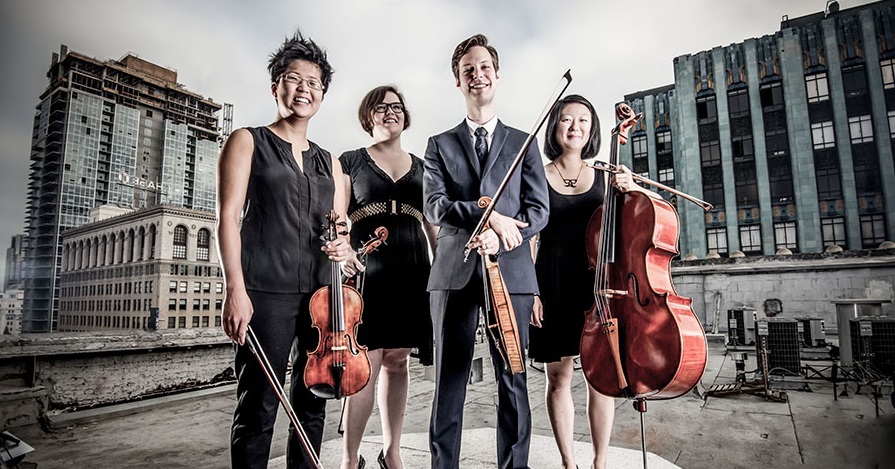
Biography and Competition Repertoire
Jason Issokson, violin
Clara Kim, violin
Diana Wade, viola
Joann Whang, cello
The Argus Quartet is dedicated to reinvigorating the audience-performer relationship through innovative concerts and diverse repertoire – connecting with and building up a community of engaged listeners is at the core of the quartet’s mission. Argus believes that today’s ensembles can honor the storied chamber music traditions of the past while forging a new path forward. In that spirit, their repertoire includes both the staples of the chamber music canon and also a large number of pieces by living composers.
Competition Repertoire
Interview with the Quartet
Interview with Diana Wade, viola
How did your quartet get its name?
When people first hear our name, they often think it’s a mythological reference—something we thought up so we could say we’re Jason and the Argonauts, but we were formed in L.A. and there’s an Argus Drive in L.A. It runs right between our favourite taco truck and an Italian bakery and deli we like. So the name comes from us eating a lot of delicious food.
How did it feel when you got accepted?
We were really excited about it. We were just starting to rehearse together in 2013 and we watched some of the live stream of the last BISQC. We didn’t meet in undergrad like a lot of quartets do, but our teachers were telling us from day one if you’re going to do any competition it should be Banff. There are many ways to make a career in a quartet, but I don’t think there’s any competition that offers anything like the support and prizes that Banff does.
What are you doing in the lead-up time to prepare?
We’re in our second year of our residency at Yale, where we coach undergrads. For that we’ve all been living together in a beach house in Connecticut, which means we’ve been spending a lot of time together–probably too much time together!
A lot of playing in a quartet is beyond rehearsing, it’s learning how to read each other all the time. It’s learning to understand the minutia of emotions. Living together like this, I feel like we breathe together better. We haven’t been playing together for eight to 10 years like other quartets, so this time has helped us synch.
In the lead-up we’ve been trying to get as much input as possible and just perform as much as possible. As of now, we’ve performed everything that we’ll be playing except for the Canadian piece. Right now we’re in Norfolk Connecticut, and the Rolston Quartet is also here, we’re actually following each other around all summer. After this we’re both going to the McGill International String Quartet Academy (MISQA) and finally end up at BISQC.
How are you preparing for Zosha Di Castri’s piece with so little time?
Normally we spend half our time playing new music, so this is a great piece to bite into. We got the piece when we were at a Vermont festival specifically working on new music, so we picked up a lot of tips and tricks there for how to play it. We’re working on understanding the language of the piece, what the colour palette is, as well as the sound and gestures.
How does the audience affect your performance?
At least for our group, we play way better in front of an audience. We love to perform. We love feeling the energy of a performance. It’s tough for us to go too long without performing in a concert because we start asking ourselves: what’s it all about?
We’re excited because we’ve heard good things about the audience in Banff. They’re supposed to be quite enthusiastic, which actually makes me less nervous about the competition. It’s much easier to play for an audience than it is to just a panel of judges. With an audience it feels like an opportunity to really do your own thing.
What does the piece you are playing for the first-ever Ad lib round?
We’re bringing a piece by Eric Guinivan. We actually commissioned the piece two years ago now, and since then it’s become our signature piece. We’ve played it a bajillion times. We find when we want to introduce ourselves to a new audience, we often say let’s play the Guinivan. In the piece all of us have a moment to shine.
Winning the grant to have this piece composed for us was our first big break as a group. We were very lucky to get it, and it made me feel like we were going in the right direction. Eric is a really efficient composer and worked with us to find out what kind of sound we liked. We premiered it in Amsterdam, but since then it’s taken on a whole new life, now it’s one of the most comfortable pieces we play and it’s been nice to see that.
What does this piece say about your quartet’s style?
We are a visually dynamic group—certainly not a group that sits still. This piece showcases our physical dynamism and a range of sounds and emotions we like to play. We like to do things as duos, so we’re very united in our sounds. Eric’s piece has a lot of drama—it’s definitely not subtle. The emotions are heightened so when it’s angry, it’s really angry.
We’re also playing a Garth Knox piece. He was a judge last year at a workshop we did with the Kronos Quartet and this was one of the pieces we played. It has us whip our bows through the air. We wanted to bring something a bit wild and weird to the competition repertoire as a way to stand out a little bit.
Do you have any last minute rituals before a performance?
We don’t have one particular ritual, sometimes we all hold hands, or give high fives. All of us go into our own zone. Jason and Joann like to be playing up to the minute we go on stage, while Clara and I are a little more zen-ed out. But we all always try and do something positive in the last moments before going on.
Castalian String Quartet (UK)
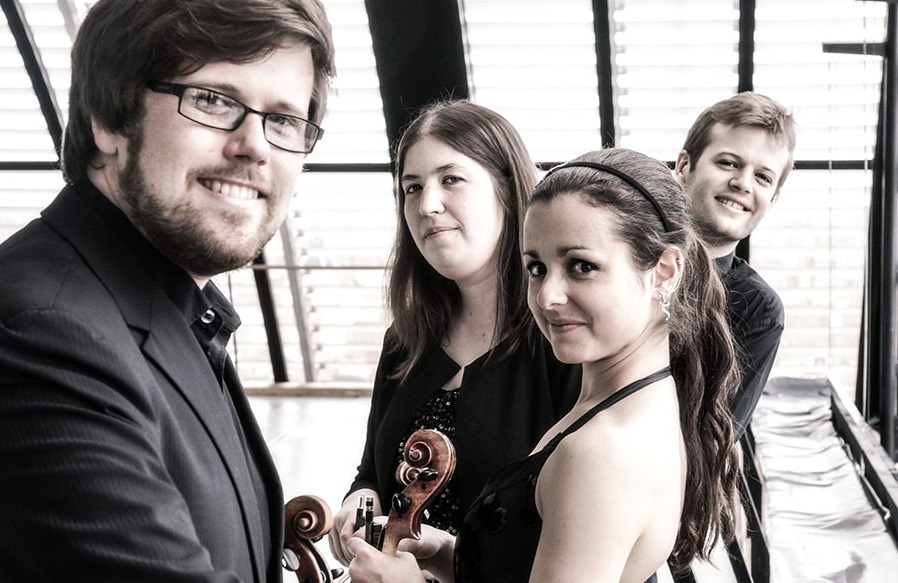
Biography and Competition Repertoire
Sini Simonen, violin
Daniel Roberts, violin
Charlotte Bonneton, viola
Christopher Graves, cello
Formed in 2011, between 2012-14 the Castalian Quartet studied with their mentor Oliver Wille at the Hannover University of Music, Dance and Theatre, graduating with a Masters. They have also received instruction from Thomas Brandis, Levon Chilingirian and members of the Endellion Quartet.
Competition Repertoire
Interview with the Quartet
Interview with Chris Graves, cellist
How did your quartet get its name?
That happened before I joined the quartet, but the Castalian Spring is a spring in Delphi. At one point in ancient history, it was a place where artists and poets went for inspiration, so that's where our name comes from.
What are you doing in the lead-up to prepare?
We've got a few festivals in August, so we've tried to line up some of the repertoire, where that's been possible. We're travelling a lot this summer; we're going to be in Italy, France, Germany and London. We're going to go play to an old teacher of ours at one point in August. Other than that just a fair bit of rehearsing.
What were your first impressions of the Zosha Di Castri’s piece?
We haven't actually had a chance yet to meet and look through it all together, so we're all just doing our own thing with it at the moment—learning our parts. It's got a high level of detail, and the challenge will be to bring all that into the larger musical context.
What are you playing for the first-ever Ad lib round?
When we got the brief saying we had 30 minutes of free choice, we felt that we didn't want to do something too normal. We saw it as an opportunity for creative programming, hopefully in a genuine sense, not just trying to do something different. We wanted to find an interesting combination of things that would illuminate each other. You still have to play it to the best of your ability, but even at the programming stage we could be creative about it.
We're playing an interesting programme based on a piece by Thomas Adès called “The Four Quarters,” which charts the flow of time through a day. It's a very beautiful, very subtle piece, and we've decided to intersperse all three movements with one movement of Schumann and one movement of Brahms which have a complementary relationship with the Adès. The two added movement also shed light on each other across the Ades. It's an interesting combination.
From the beginning we liked the idea of using the Adès as the basis for the program because it has a cyclical nature and shape which is very absorbing. Often when you're playing a piece, you feel the influence of other composers. You feel there are other pieces that are sympathetic with it. It's a really substantial piece of music, with a lot of different aspects, colours and techniques, but you definitely see through it many different periods of music. We had different ideas of what we would combine it with and we went in the direction of Shumann.
How does the audience affect your performance?
That's very subtle. You notice the level of attentiveness and the level of involvement. When you feel that high level of listening it brings more out of you because you feel that you're actually communicating meaningfully.
Omer Quartet (USA)
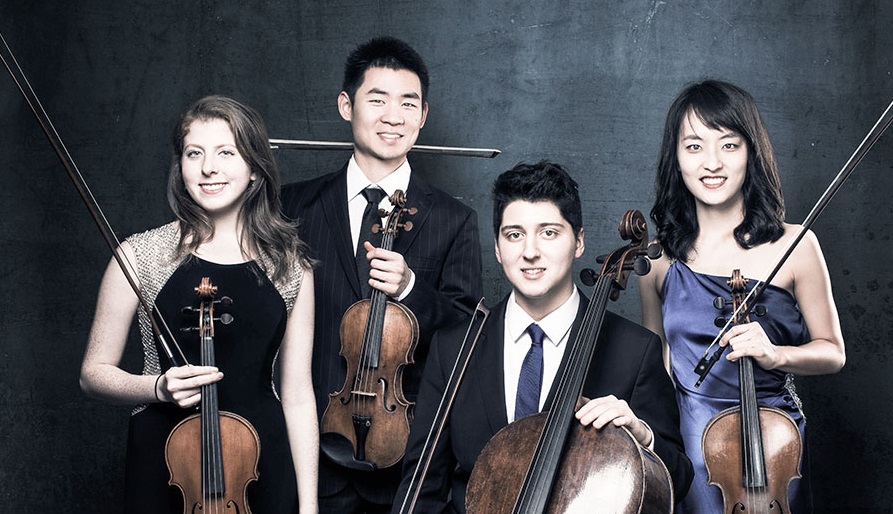
Biography and Competition Repertoire
Mason Yu, violin
Erica Tursi, violin
Jinsun Hong, viola
Alexander Cox, cello
Established at the Cleveland Institute of Music in 2009, they have appeared on the WFMT radio network and the Aspen Public Radio. As guest artists, they have performed in the Dame Myra Hess Memorial Concerts, the Cleveland Chamber Music Society, the Western Piedmont Symphony Chamber Classics Series, the Fontana Chamber Arts and the Palm Beach Atlantic University Distinguished Artist Series. The quartet has collaborated and performed with internationally renowned artists such as Cho-Liang Lin, the Assad Brothers, and the Borromeo String Quartet. In 2011, they were invited by Banff Centre to give a world premiere of Bob Becker’s Preludes for percussion and string quartet.
Committed to community education and advocates of civic engagement, the Omer Quartet devotes time to creating interactive programs. They recently completed a fellowship with Music for Food, a musician-led initiative directed by Kim Kashkashian for local hunger relief. As fellows, they were involved in the organization’s various educational projects, including leading assemblies and masterclasses for middle and high school music students.
Competition Repertoire
Interview with the Quartet
Interview with Alex Cox, cellist
Have you been to Banff Centre before?
Yeah it was actually our first summer festival together as a quartet. That was 2011. It was amazing. There are the obvious things, like the amazing scenery of Banff. It felt like I was in the middle of The Sound of Music, but more than that, they had a really exciting group of faculty. We were surrounded by these amazing chamber music gurus. We were so excited the whole way through--just having such a good time.
How will your experience be different returning as a competitor?
When we were there for the Chamber Music Residency, that's when we found out about the Banff International String Quartet Competition. We were very impressed with the quartets that summer and we thought ‘wouldn't it be really cool to be in that competition one day?’ It seemed pretty clear, from asking around that it was like the quartet Olympics. It will be a neat experience, having dog-eared that idea back in 2011, to now be coming back as competitors.
How did it feel when you got accepted?
We worked really hard to put together the package with the recordings. We were hoping for the best, but not really expecting anything because we knew how selective the process was. So when we found out we got in, we were super excited. It will be great to travel there and meet other quartets, as well as see if we have what it takes to do well at the competition. We were all really thrilled, but now that's starting to turn into stress as the competition gets closer.
How are you preparing for the competition?
We had our eyes set on the competition back in September or October, so we've been scheming our preparation since then. We did a couple competitions in preparation for Banff, including the Bordeaux [International String Quartet] Competition in France and one in Michigan called the M Prize. We entered a couple of the competitions with the hope that we wouldn't be quite so green by the time we get to Banff. We're at the Ravinia music program in Chicago right now, so we're just doing what we always do: rehearsing a ton, playing for a lot of people.
How are you preparing for Zosha Di Castri’s piece with so little time?
Oh yeah, that's been fun. All of us have different levels of experience with new music. I am probably the least experienced, so when I first saw the score for Zosha's piece I wondered what was going to happen. But other members of the quartet are more skilled with how to prepare a piece like that. We've just been taking it slow, measure by measure, with the scores in front of us. We have been taking turns playing for each other to make sure we're getting the rhythm and the markings all accurate.
What stood out to you when you first looked at the piece?
It definitely doesn't look like Beethoven on the page. There's a ton of notations. She's very meticulous about what she's imagining, so that's a lot to take in. It takes a lot of studying to understand her own personal language. Some of the extra markings we're not used to seeing. This doesn't look like anything else that we're playing in Banff.
How does the audience affect your performance?
We had a performance in Boston at a violin shop in preparation for our bigger recital and there were only two people in the audience. I'd never experienced that before. It became even clearer than it already was how valuable an audience is. It's pretty hard to get psyched up when you're not playing for anybody. At the end of the day, you don't want it just to feel like a peer rehearsing again. The audience is what makes it feel like an occasion. Just their presence during a performance makes us much more enthusiastic about wanting to communicate our interpretation.
What are you playing for the first-ever Ad lib round?
We're going to play Bartók quartet. It's actually the same Bartók we performed when we first came to Banff for the chamber music program. It's just a funny coincidence. And we know obviously Banff has a great connection with some Bartók specialists.
What does this piece say about your personality or style as a quartet?
It's a pretty exciting piece and I think that we're always attracted to music like that. The piece starts off quite slow and a little tragic and I think, me being a cellist, that's kind of our sweet spot. The cellist anthem is anything that's melancholy. It's has a ton of variety in it, we really like variety. We love the way that the piece unfolds, it's one of the best stories in the quartet literature and I think we all really like this idea of storytelling.
The piece is written for a string quartet. He wrote it after having this really horrible experience of unrequited love for a really famous violinist of the time, named Stefi Geyer. It starts off really slow and he writes about the piece, specifically saying that the first movement is like a funeral dirge. The piece gets faster and faster as it goes through and he talks about how it's like a return to life. There are some real direct connections to what a human being was experiencing and what he wrote it down. You can understand a feeling of loss and then a feeling of acceptance and moving on. You don't always get that storytelling element spelled out to you in such an obvious way.
Do you have any last-minute rituals before a performance?
So there's the obvious last minute wishing I had more time—I think we all have that. As far as that checklist goes, we probably tune 100 times before performing. When we're really in a good state of mind we talk about the beginnings of each of the movements and what we want to go for. Sometimes we have this kind of a nerdy thing, where we'll all stand in a circle and just take a deep breath together right before we go on. That's what we're trying now.
Quartet Arpa (Japan)
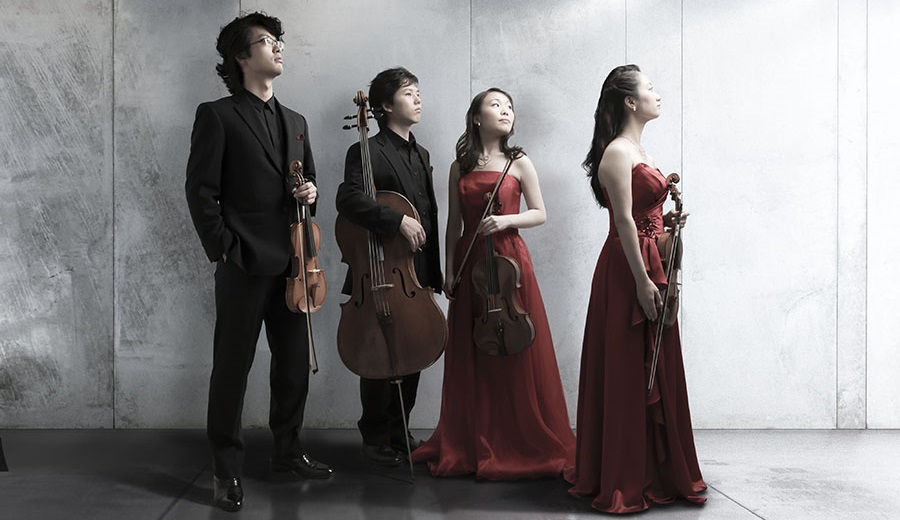
Biography and Competition Repertoire
Kyoko Ogawa, violin
Nao Tohara, violin
Ayane Koga, viola
Yu Ito, cello
Quartet Arpa was formed at Geidai (Tokyo University of the Arts) in 2013. They have studied under prominent artists including Kiyoshi Okayama, Koichiro Harada, Yoshiko Kawamoto and Kazunori Kawasaki. As the selected fellow ensemble at Suntory Hall Chamber Music Academy, they will complete a two year course under the guidance of Tsuyoshi Tsutsumi, Kikuei Ikeda, Kazuhide Isomura, and Quartet Excelsior. Additionally they were invited to the International Summer Academy in Vienna to complete a masterclass with Yohannes Meissl. They have performed in a number of festivals and events including the Suntory Hall Chamber Music Garden, the Lake District Summer Music in UK, Toyama Chamber Music Festival, and the Risonare Chamber Music Seminar, where they won the First Prize in 2016. This May, Quartet Arpa was invited to Singapore to attend the collaboration program of Suntory Hall and Yong Siew Toh Conservatory of Music. Apart from regular concert performances, they participate frequently in community engagement programs in school classrooms, museums, and other public spaces.
Competition Repertoire
Interview with the Quartet
Interview with Kyoko Ogawa, violin
How did your quartet get its name?
Prof. Kiyoshi Okayama gave our name because when we started this quartet, we played Beethoven’s String Quartet No. 10, nicknamed the "Harp."
Where did you meet/form?
We met at Geidai the Tokyo University of the Arts in 2013. We are all the same age.
How did you feel when you got accepted?
We were very happy to be selected as one of the few quartets to compete in this competition.
What would it mean to you to win?
It would give us a chance to be known around the world and would be a great opportunity to perform.
What are you doing in the lead-up time to prepare?
We are rehearsing a lot and we have been continuing to learn with masterclasses at different festivals and lessons as part of our fellowship with the Suntory Hall Chamber Music Academy. We are also performing in several concerts this summer.
What are your first impressions of the Zosha Di Castri’s piece?
We have been rehearsing together and trying to solidify how we imagine the piece. Our first impressions were that the piece was shorter than we thought it was going to be, but very well-composed. It’s been very easy to understand and imagine what the composer was envisioning when writing.
How does the audience affect your performance?
An audience puts us on our toes—makes us a little nervous—but that improves our concentration.
What are you playing for the first-ever Ad lib round?
We’ll be playing Beethoven’s String Quartet No. 10, “the Harp.” We think this pieces is a good showcase of our sincere attitude.
Quartet Berlin-Tokyo (Israel/Japan)
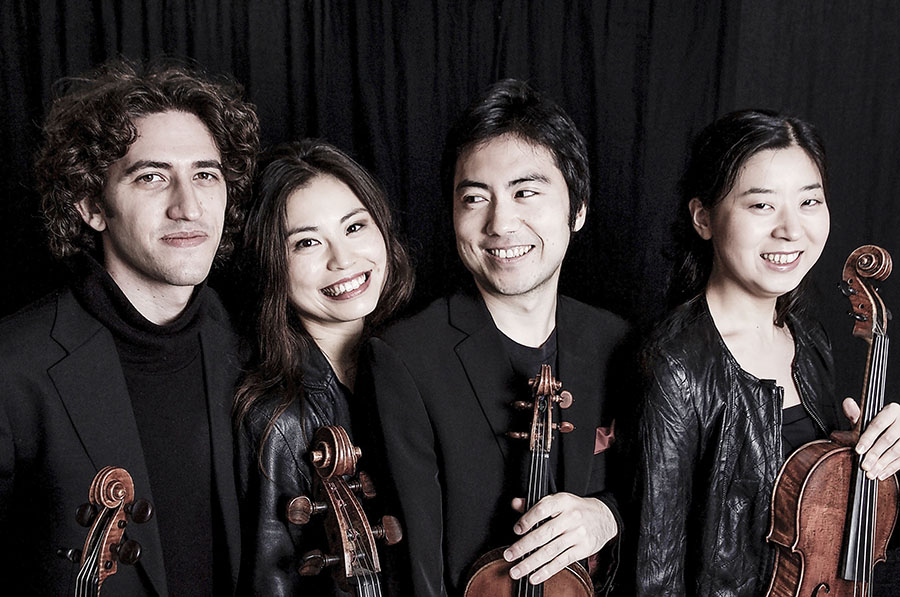
Biography and Competition Repertoire
Tsuyoshi Moriya, violin
Dimitri Pavlov, violin
Eri Sugita, viola
Ruiko Matsumoto, cello
Winners of multiple international Prizes and recognition such as ‘’Young Concert Artists Audition New York’’, ’’JOSEPH JOACHIM’’ Chamber Music Competition, prestigious “Franz Schubert” competition, ''Carl Nielsen International Competition'', 2nd & public Prize at the ‘’Salieri Zinetti’’ competition,1st & public Prize at the ‘’Orlando Quartet Competition’’, prestigious Matsuo-Foundation Japan,’’Irene Steels-Wilsing’’ Foundation,''HSBC Laureates'' France & Special prize at the ARD String quartet competition in Munich,Germany.
Competition Repertoire
Interview with the Quartet
Quartet Berlin-Tokyo, interview with Dimitri Pavlov, violin
How did you get your name?
I think we are the only quartet in history that didn’t choose their name. For the first festival we did together, they asked us to come up with a name. We thought about a couple of very pretentious names like all the groups always take, and they didn’t like our choices. So they just said, “You’re from Berlin and half of the group was based in Japan.” So they called us Berlin-Tokyo. It’s a very simple name. We got used to it and we like the simplicity of it. People can always remember it.
Where did you meet?
We were all studying in Berlin. It’s funny because all of us in the quartet had played with each other before. The cellist played with the viola in another quartet in Japan, I played with the cellist, and the first violin and the cellist are a couple, so there was a connection before. We were all finishing our studies in Berlin when we were invited to a festival in Japan. That was the first time we played together as a quartet, and it was a big success.
How did you feel when you got accepted?
Actually we were not expecting to be accepted because we already applied to the last BISQC and were not accepted. This time we didn’t have so much hope, but it’s put a great wind in our sails.
What are you doing in the lead-up time to prepare?
Most of our program is already ready. For example there is a modern piece we’ve chosen by a German composer Jörg Widmann and we are going to work with the composer next month. Hopefully it will give us a good push we can bring to the competition.
How are you preparing for Zosha Di Castri’s piece with so little time?
The most difficult part of preparing a new piece for a competition is arranging the score so you can play it on the stage, because normally composers make it impossible to play a new piece on the stage. First of all, you have to be very good at making a collage from the notes so you can play it on the stage. Then the rehearsals are very concentrated. The difficult part is it’s mostly composers you have never heard before, so you have no context. You have to imagine what was going on in the mind of the composer when she was writing it. You know that all the quartets will be performing this piece. So we’re between making it as special as possible, so nobody can forget us or trying to make it as correct as possible. There are always these two polarities.
What are your first impressions of the piece?
We haven’t started preparing the piece, so the only impression is: “Oh my God, I have to prepare this piece.”
How does the audience affect your performance?
Some quartets are so good at preparing a piece that their performance sounds that same as the rehearsal. There are other groups, like our group, that work really hard and then we get on the stage and we get a boost of 50 per cent during the performance. We never know exactly how it will go on the stage, but most of the time it’s much better than in rehearsal.
What are you playing for the first-ever Ad lib round?
We’re playing String Quartet Op. 95 from Beethoven.
What does that piece say about your quartet’s personality and style?
The Beethoven quartet is a piece we’ve been playing for three years. It’s a piece we actually got our very first prize with for in an international competition in Holland. In a way, you can say we share this piece because it has four movements, and they’re very concentrated and very abrupt. It kind of bears our DNA inside it. We’re very connected to this piece.
What do you do to prepare before a performance?
Every time is different. We are very flexible people, so it depends on the day. Sometimes someone is very sensitive, so they’ll ask not to have a rehearsal the same day. Other times, people are not sure about the concert, so we’ll have very long rehearsals. We always try to find the secret recipe, but it’s kind of impossible. People have different reactions to different concerts. In a way it’s fun that we don’t have a routine.
Rolston String Quartet (Canada)
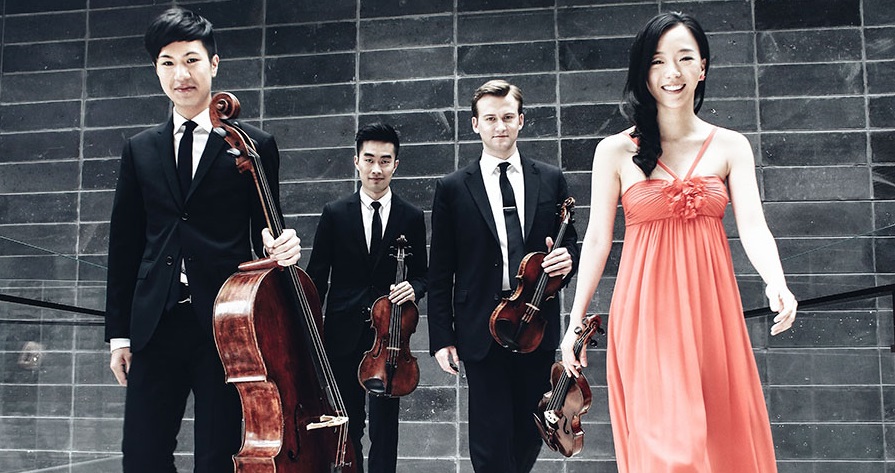
Rolston String Quartet, 2016 BISQC 1st Prize Laureates
Biography and Competition Repertoire
Luri Lee, violin
Jeff Dyrda, violin
Hezekiah Leung, viola
Jonathan Lo, cello
Grand prize winner of the Chamber Music Yellow Springs Competition and prize winners of the M-Prize and Bordeaux International String Quartet Competitions, the Rolston String Quartet has performed throughout the United States, Canada, and Europe in venues such as the Kennedy Center, Harris Hall, Koerner Hall, and the Auditorium de Bordeaux. Notable collaborations include performances with renowned artists Andrés Díaz, Gil Kalish, Mark Morris, Jon Kimura Parker, Barry Shiffman, and Miguel da Silva. Additionally they have worked with composers John Luther Adams and Brian Current.
Competition Repertoire
Interview with the Quartet
Rolston Quartet, interview with Hezekiah Leung, viola
How did you get your name?
The name comes from Tom and Isobel Rolston, who were long-time directors of the music programs at Banff Centre. It’s quite a big Canadian legacy. We’re all Canadian and we formed as a quartet for the Banff Chamber Music Residency, which is a three-week summer program. After that, our first concert together was at Banff Centre’s Rolston Recital Hall, and we thought it would be appropriate to find a name that has Canadian heritage, so that we can represent Canada in some way. We all know Shauna Rolston, their daughter, so we asked her for permission. Luri Lee, our first violinist, is using Tom Rolston’s violin, on personal loan from Shauna. It’s a Carlo Tononi violin, so it’s a really famous Italian maker. Tom Rolston was a really renowned Canadian violinist, so for Luri, it’s such an honour to be able to use that violin.
What is your experience with Banff Centre?
The quartet has been going to Banff Centre together every summer for the last three years. As an individual, Hezekiah Leung, the quartet’s viola, has been going to Banff Centre for seven summers in a row to participate in the master class program and the orchestra program. It’s like a second home for us.
How will your experience be different returning as a competitor?
As a competitor, I don’t think it will be any different. We’re super excited to be able to compete in the competition, but the great thing about it is the audience. From what we hear, the audience is super enthusiastic about string quartet music. We’re very happy and honoured to be a Canadian quartet playing there.
How did you feel when you got accepted?
Super happy. That was one of our biggest goals to go for, ever since we started the group. We said, “We’ve got to do this competition in three years.” It’s been incredible. Hard and challenging, but striving to get into the competition has been amazing.
What would it mean to you to win?
We’d be extremely happy. First of all, to have an international career, which the Banff competition offers if you win, would be just incredible for us. To share our music and to be Canadian, is amazing.
What are you doing in the lead-up time to prepare?
We’re going to as many music festivals as we can. Constantly playing for people and being able to perform is really important for the competition itself. Right now we’re at the Norfolk Music Festival in Connecticut. For six weeks we’ve been working with mentors and playing concerts. After that, we’re going to the Montreal International String Quartet Academy, which is 10 days with intensive coaching and performances, right before the competition.
How are you preparing for Zosha Di Castri’s piece with so little time?
It’s quite a challenging piece. We’re just slowly picking at it each day.
What are your first impressions of the piece?
It’s a work with a lot of emotion and drama. It also has a lot of intense characters that go within the sections. There are a lot of markings that could represent a tape looping around, or certain things reoccuring. So there are certain sections that come back. It’s a crazy, exciting work that’s super challenging. We’re very excited to perform it and then also listen to all these other interpretations of this work.
How does the audience affect your performance?
On stage, it really gives you a different energy depending on the vibe of the audience. Music in itself is like a conversation between the performer and then the audience, sending music to them and receiving what they feel and react to certain things. It can be emotional or it can be exciting.
What are you playing for the first-ever Ad lib round?
We’re playing Schubert Quartettsatz, which is a single movement. After that, we’re doing Bartók’s “Third String Quartet”.
What does that piece say about your quartet’s personality and style?
First of all, we love them to death. The Schubert is the most beautiful short work ever, it has the most lyrical first violin melody and just beautiful harmonies. We care a lot about the sound. For the Bartók there is likewise such good harmony within the music. Every time we rehearse it, we try to play really slowly just to hear all the harmonies in it. It always amazes us how much you can’t hear if you play it at a fast tempo.
What do you do to prepare before a performance?
We want to be rested well and then what’s really important right before performance is to get a group calmness that we can connect really well. We sometimes play the under tempo slow to make sure we’re all feeling connected together.
Tesla Quartet (Russia/South Korea/USA)
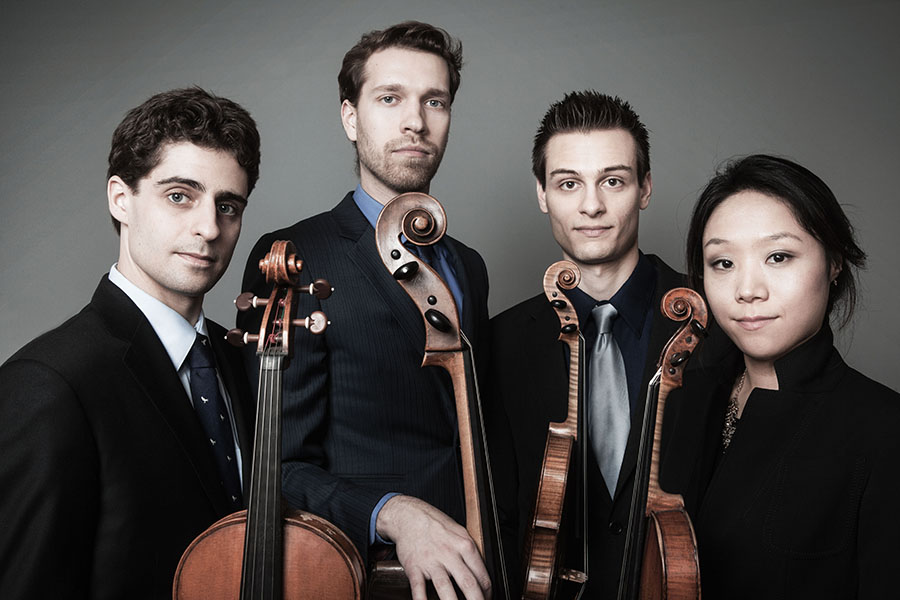
Biography and Competition Repertoire
Ross Snyder, violin
Michelle Lie, violin
Edwin Kaplan, viola
Serafim Smigelskiy, cello
Dubbed “technically superb” by The Strad, the Tesla Quartet has garnered top prizes at numerous international competitions, including the Gold Medal at the 2012 Fischoff National Chamber Music Competition, Third Prize and the Best Interpretation of the Commissioned Work at the 6th International Joseph Haydn Chamber Music Competition in Vienna, and Third Prize at the 2012 London International String Quartet Competition. The London Evening Standard called their rendition of the Debussy Quartet “a subtly coloured performance that balanced confidently between intimacy and extraversion.”
Competition Repertoire
Interview with the Quartet
Tesla Quartet, interview with Ross Snyder, violin
How did you get your name?
When we were sitting down to think of a name, we wanted to try to find a name a little unusual in what it represented. I was reading about Nicola Tesla, an electrical engineer. A lot of his work was about bringing communities closer together through technology, and about tapping into Earth’s forces to generate power. Like how we connect with an audience, it’s just like Earth’s natural forces. We generate an emotional force.
Where did you meet?
We formed in Juilliard School in 2008. Ross is the only original member from the quartet. The current cellist, Serafim, is also from Juilliard. Michelle joined the quartet in 2009 when the quartet studied at Colorado University on a graduate fellowship, but she and Ross have known each other since 2004. Tesla’s two newest members joined the group in 2014, but they have all known each other through performances for several years.
The members are from all over: Ross grew up in Pittsburg, USA; Michelle is from South Korea, but was born in Germany; Serafim is from St. Petersburg, Russia; and Edwin is a native New Yorker.
Do you have a history with Banff Centre?
The Tesla Quartet has spent the last two summers participating in the month-long Chamber Music Residency. We feel a little at home in Banff. I don’t think the competition will be much different. In the Chamber Music Residency, you set your own schedule. It’s a very nurturing environment because it’s small and everyone is working on something similar. The competition is inclusive, warm, welcoming and congenial—we expect it to be less cut-throat than other competitions. It’s probably as comfortable of an experience as you can have in a competition. We are also familiar with the area and some of the die-hard locals who support the competition. I think it’ll be a really positive experience.
How did you feel when you were accepted to compete?
It felt great! We’ve done a handful of competitions in the past, and have always wanted to compete in Banff. We have other colleagues that will also be competing, so it feels more like a festival than a competition. We’ve been preparing our repertoire for a while. It’s nice that we get to play in four rounds, and play most of what we have prepared.
What would it mean to you to win?
It would be really meaningful. It’s a real boost, professionally. We generally try to treat competitions like performances, so we do our best. It would be a good feeling to win. We look forward to the concerts, we just love performing. We would take advantage of what the prizes have to offer with recording and touring.
What are you doing in the lead-up time to prepare?
We spent June in Banff at the Chamber Music Residency, and in July we’ll all be away doing separate projects. The whole month of August leading up to the competition, we’ll be putting the final touches on the rounds. We have the dates and times, so we may try to mimic the competition by performing the pieces at the same time as the day of the competition. It’s all just polishing to perfection at that point.
How are you preparing for Zosha Di Castri’s piece with so little time?
It’s difficult to prepare a brand new, challenging piece in such a short amount of time. It takes a lot of time individually learning our parts and then how they fit together. The piece is quite challenging, but there is a lot of freedom in the way that Zosha Di Castri has written it. The way she’s written it, it’s open to a lot of interpretation, so we’re having fun seeing what we can do with it.
How does the audience affect your performance?
The audience itself is integral to make an effective performance. They add a certain amount of energy. We feed off of that energy, and they feed off of us—it’s a mutual relationship. And it’s that energy that our namesake comes from. We really try to play our best, and an audience is a huge factor, especially a huge audience like at BISQC. Local supporters get really into it, and they pick favourites. It’s nice to have that energy where people are rooting for particular groups.
What are you playing for the first-ever Ad lib round?
Hugo Wolf’s "Italian Serenade," Joaquin Turina’s “Prayer of the Bullfighter” and Marcus Goddard’s “Allaqi”, which is inspired by Inuit throat singing. It represents the idea of travel and multicultural influences on music. We felt it went along with our own story, since our quartet is made up of people with different backgrounds, where we’re from, and training. I think all the songs mix well together.
What do you do to prepare before a performance?
Normally on a performance day, we try to get a lot of rest and not rehearse too much. If we play too much of a piece we’re performing that evening, it’ll get too structured. We want to leave room for spontaneity in a performance. So we play other pieces together to do a soundcheck and get the acoustics of the venue.
Ulysses Quartet (Canada/Taiwan/USA)
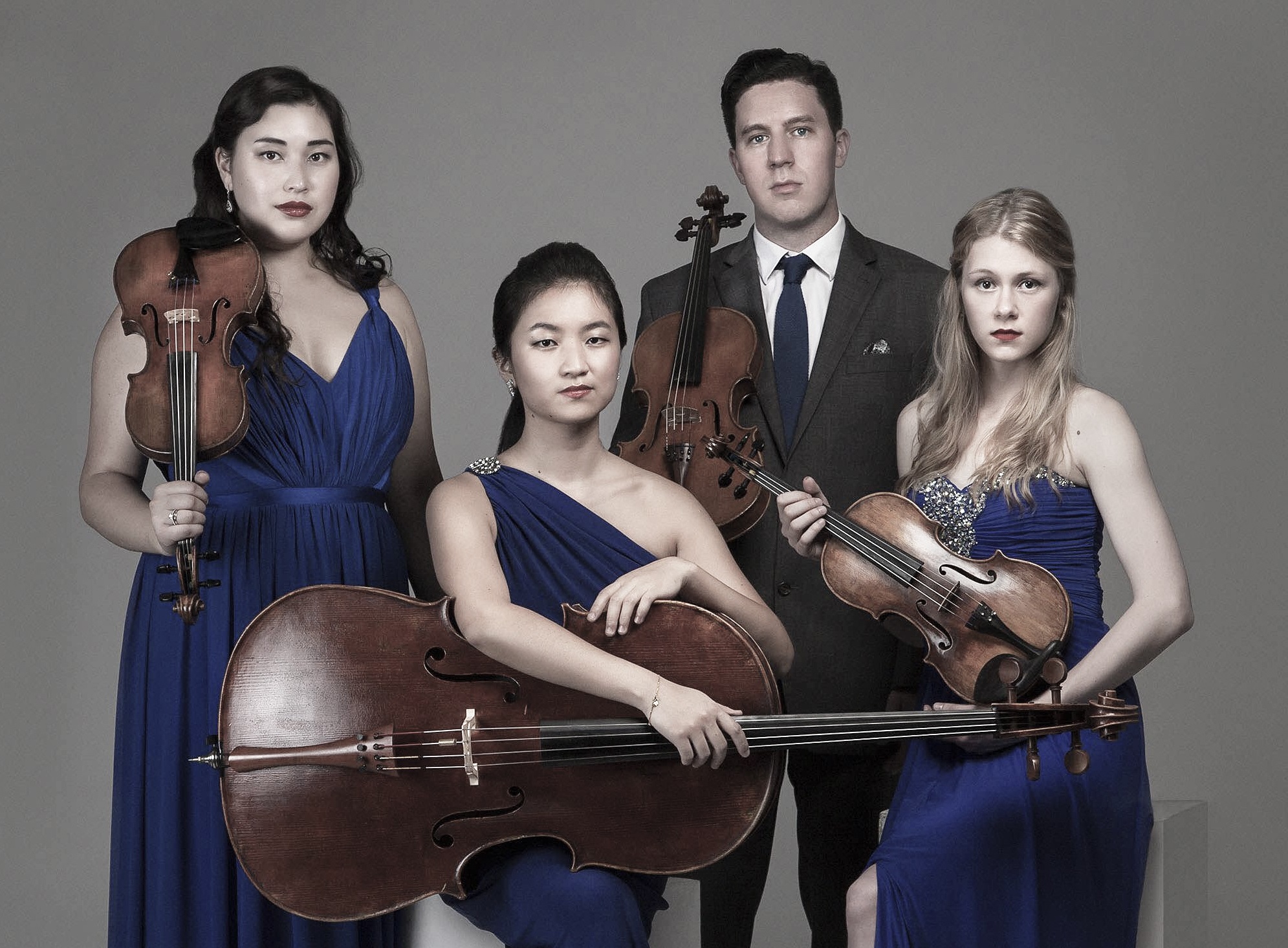
Biography and Competition Repertoire
Christina Bouey, violin
Rhiannon Banerdt, violin
Colin Brookes, viola
Grace Mei-En Ho, cello
Winners of the Grand Prize and the Gold Medal in the Senior String Division of the 2016 Fischoff National Chamber Music Competition, the Ulysses String Quartet was founded in the summer of 2015. Hailing from Canada, the United States, and Taiwan, members have performed in prestigious halls such as Esterházy Palace, Carnegie Hall, and the Taiwan National Concert Hall. Their exciting first season together has included concertizing with the Halcyon, Listen Closely and Massivemuse Series. Ulysses Quartet has a partnership with Groupmuse and headlines their major concerts. Members perform on instruments and bows graciously on loan from the Canada Council of the Arts Instrument Bank and the Maestro Foundation.
Competition Repertoire
Interview with the Quartet
Ulysses Quartet, interview with all members
How did you get your name?
We were looking for a name that had meaning to us in terms of our artistic practice, but also about where we’re from. We all live in the same area and we wanted something that reflected that. The tomb of Ulysses S. Grant is near where we all live, it’s a big monument, so that’s part of our history. The other part of the name is that Ulysses is a reference to The Odyssey and a quest for meaning and finding your way through life, finding your way home.
Do you have a history with Banff Centre?
Christina participated in the Master Class for Strings and Winds program at Banff Centre two years ago and in 2016.
How will your experience be different returning as a competitor?
Banff is such a creative place, so it will still feel creative, but there is somewhat of a pressure to do our best. We just really want to present who we are musically as a group, and just do our best in that respect, and bring the music the way we see it to the audience. It will definitely be a different vibe for sure.
How did you feel when you got accepted?
We were surprised. We were very honoured and excited to be accepted. We’re such a young quartet. We’re at the point where we just want to play as much as we can for as many people. Actually, when Colin told us that he got the call that we were accepted, Christina accused him of joking. Like, why would he joke about that? It was pretty crazy. At that point, it was the biggest milestone for our quartet. It was the first thing that we were like, “Wow, we did that together.”
What would it mean to you to win?
That would be incredible. As a Canadian, Christina has always followed BISQC, and Banff is very special because that’s where her parents met during a music residency. It’s a big step in our career to be able to play at Banff. It would definitely launch us in the direction that we’re heading.
What are you doing in the lead-up time to prepare?
We’ve been playing these pieces for a while for different coaches and concerts. We’re going to do some more concerts in the city, to get really familiar with the pieces. Some of the repertoire has been with us for a long time, but some of it is newer. We’ll be going pretty hard with the rehearsal process as well.
How are you preparing for Zosha Di Castri’s piece with so little time?
We’re starting by deciphering the score and doing the groundwork before we really bring it up to speed, so we’re piecing it together according to the different techniques. Some of it is familiar and some of it is totally new. The piece has its own specific language, so I think we have to really familiarize ourselves with what that feels like and what that sounds like before we can put it into a really coherent narrative.
What are your first impressions of the piece?
It’s a piece that has a really incredible range of different kinds of sounds and emotions, so that’s been interesting to wade through the way it changes over the course of the piece. There are a lot of extremes, which is very exciting.
What are you playing for the first-ever Ad lib round?
We are doing Janáček’s String Quartet No. 2, “Intimate Letters.”
What does that piece say about your quartet’s personality and style?
It’s such a wildly emotional and raw piece. It’s about Janáček’s love for this woman though they never ended up together. It’s a piece with big personality, but at the same time the four of us have huge personalities. Ever since we got together and started talking about our repertoire, this was one of the first pieces that came up that all of us were really excited to play. It’s a favourite for many of us in the quartet. It’s the most incredible outpouring of somebody’s deeply personal experience. I think for us as a quartet, that’s something that resonates with us as something that’s very immediate and very personal. When we walk away from that stage, we’ll know that we bared it all.
What do you do to prepare before a performance?
I try to have a good amount of food, and prepare mentally and stay calm. In the past, we’ve worked really hard to put the preparation in beforehand so that on the day of we can take care of ourselves. We don’t play too much, just relax and stay in the zone. And not try to cram something at the last minute. We all like to sleep in.
Verona Quartet (Canada/Singapore/USA)
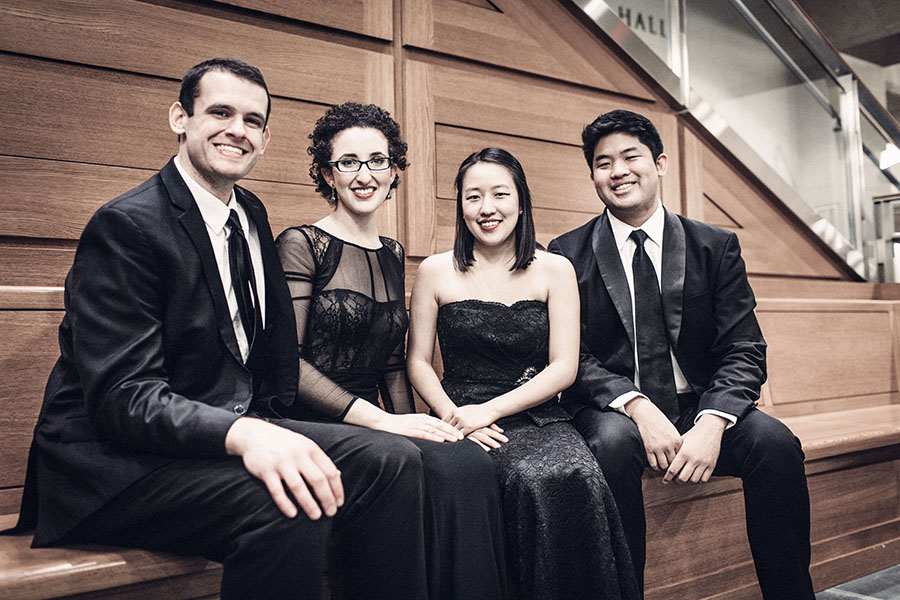
Biography and Competition Repertoire
Jonathan Ong, violin
Dorothy Ro, violin
Abigail Rojansky, viola
Warren Hagerty, cello
Hailed by critics as “thoughtful, impressive musicians” (Cleveland Classical), the Verona Quartet, formed in 2013, are winners of the 2015 Victor Elmaleh Concert Artists Guild Competition. Until 2015, the quartet was in residence at the Indiana University Jacobs School of Music, and is currently the Graduate Resident String Quartet at The Juilliard School. The Verona Quartet are Musical America’s New Artist of the Month for May 2016.
Competition Repertoire
Interview with the Quartet
Verona Quartet, interview with Abigail Rojansky, viola
How did you get your name?
We used to have a different name, which we’d chosen because we had given our first concert as a quartet in the home of a patron of the arts. But it was a very difficult name to pronounce, a German name, so we were looking for a different name. We were really inspired to pay tribute to Shakespeare and his love of Verona and the use of Verona in literature. We thought that would be a nice way to bring together different sides of art, literature, and music.
Where did you meet/form?
We came together at Indiana University, and that’s where we started playing as a quartet. We were in residence there for two years, and then last year we were the graduate quartet at The Juilliard School.
Do you have a history with Banff Centre?
We have not been as a quartet, but one of our violinists is Canadian and she’s been to the Banff Centre. Our cellist has been as well.
What would it mean to you to win?
It would mean the world, of course, not just to have given performances that a panel of experts felt were worthy of that, but for the other concerts that come from it. That would mean a lot to us at this point in our career. But also to be in among a group of competitors who are all incredible musicians and amazing colleagues. It’s a hard position to be in, but it’s also wonderful to be surrounded with that kind of talent. To be recognized for it would mean quite a lot to us.
What are you doing in the lead-up time to prepare?
We’re working very hard on our repertoire for the competition. The commissioned work is very exciting, and obviously, that’s been taking up a lot of our time recently. We have some other projects going on throughout the summer. We’re currently at the summer string academy at Indiana University, where we’re teaching. We’re giving lots of concerts. We’ll be going to the La Jolla Summerfest right before Banff. We’ve got some collaborations there and we’re doing some projects where we play outside of our quartet. Even though we’re working very hard and having long rehearsals, we’re just trying to keep our music making alive by having our own projects. It’s invigorating for the rehearsal process.
How are you preparing for Zosha Di Castri’s piece with so little time?
We’ve been going at it in sections and breaking it down with the score. We practice it on our own before coming to rehearsals so we know what we’re actually putting together. We’re trying to understand her language, because the language she’s using is very much her own. So, trying to get to know her as a person.
How does the audience affect your performance?
It’s a crucial part. We talk about how we perform with our instruments. Part of the instrument is the room that we’re playing in, but definitely the audience is a part of that instrument too. We feed off of their energy. That’s where our artform comes from. It’s all about performing for a live audience, so having people there adds to the excitement of the performance. And there’s the joy of having worked so hard on our repertoire and to then bring it to an amazing audience.
What are you playing for the first-ever Ad lib round?
We understood that this is really the opportunity to express who we are and to present something that means a lot to us. For us, one of the pieces that has the most intrigue for our quartet is Ligeti’s “Métamorphose Nocturne”. It’s a piece that’s been with us for, albeit, the short time that we’ve been together, but since the beginning. It’s a masterpiece and we feel very strongly about it. We’ve paired that with “Six Bagatelles”, which might seem like an antithesis to Ligeti, because it is so brief, but we really feel like it is also this incredibly deep masterpiece. It’s as if he condensed a 22-minute work like Ligeti into three and a half minutes. So we’re really excited to bring those two to the Ad lib round together.
What does that piece say about your quartet’s personality and style?
I think it’s really up to the listener to glean from our performance what they will. Part of what we love about it is the incredible amount of detail that Ligiti brought to writing the score. He wrote it for himself. It was an expression of his innermost thoughts and feelings about writing music. We bring to it a deep sense of respect for that kind of compositional intensity. Intensity is probably a good word to describe that. Absolutely, we feel the same way about the “Six Bagatelles” and the way it’s written into the piece. We try to bring just as much precision and intensity to the performance.
What do you do to prepare before a performance?
All four of us have our own little things that we like to do. We’ll usually rehearse just a little bit to try to keep our muscles warm. And we try to feel fresh, not too overtired. Our cellist likes to be on his own, and others of us have certain pieces that we like to play beforehand that are the pieces that we are going to be playing that day. Just keep things happy and focused on musical things.